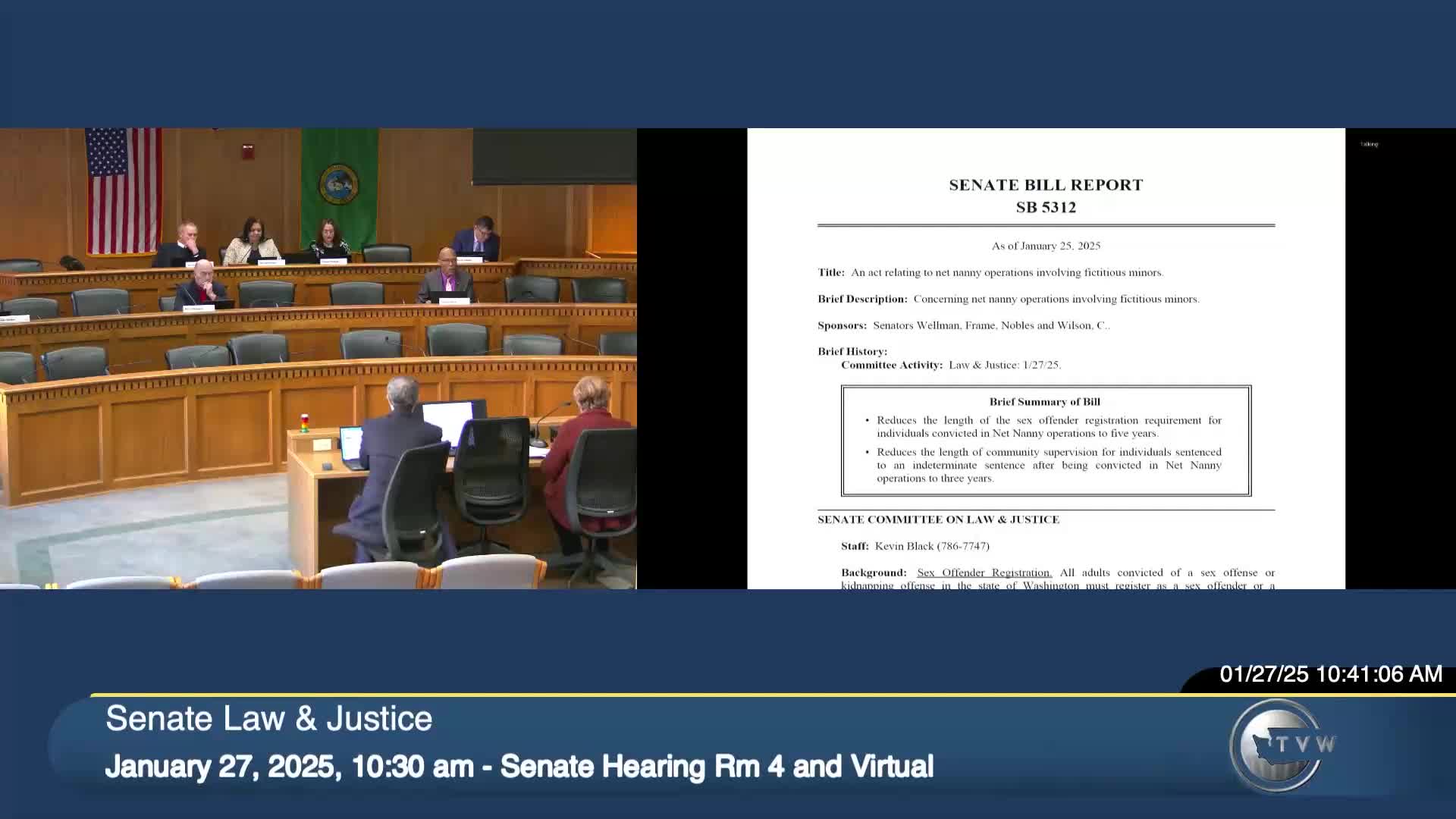Lawmakers hear mixed testimony on bill to shorten registration and supervision for convictions from "net nanny" stings
Get AI-powered insights, summaries, and transcripts
Subscribe
Summary
Senate Bill 5312 would shorten registration and supervision for people convicted through certain Internet sting operations (Operation Net Nanny) if the person has no prior sexual-offense history; the proposal drew both support and opposition at a Law and Justice Committee hearing.
Senate Bill 5312 would reduce registration and supervision requirements for people convicted through so-called net nanny Internet sting operations if the person has no prior convictions indicating predatory behavior toward a minor. Kevin (staff) briefed the Law and Justice Committee that Operation Net Nanny is an Internet sting program administered by the Washington State Patrol Missing and Exploited Children Task Force since 2015; from 2015–2023 the task force conducted 20 sting operations and made 311 arrests, according to a Washington State Institute for Public Policy summary cited in the staff briefing.
Senator Lisa Wellman, prime sponsor, said the bill targets first-time offenders convicted in net nanny stings who have no prior sexual-offense history and no other evidence of predatory behavior. "What this bill does is a time for supervision and registration, and says it's not forever," Wellman said, arguing that a defined end to registration and supervision would allow rehabilitated people to rebuild their lives.
Under current law, staff told the committee, registration requirements for convictions can run 10 years, 15 years or life depending on offense level. SB 5312 would reduce registration to five consecutive years in the community without conviction of a disqualifying offense for qualifying cases, and reduce supervision for an indeterminate-sentence release to 3 years where the person has no prior convictions for sexual or kidnapping offenses indicating predatory behavior. A fiscal note has been requested but not received.
Public testimony split along lines of security and due process. Supporters — including defense attorneys, impacted people and advocacy organizations — described long-term harms from lifetime registration and supervision imposed after non-contact stings, especially for young people and those with disabilities. Joanne Glohan, speaking in support, said the bill addresses "a serious injustice of sentencing young first-time offenders to lifetime registration and supervision for crimes where no harm has been done to a person." Several testifiers urged inclusion of justice-impacted members on oversight bodies and noted collateral consequences such as housing and employment barriers.
Prosecutors and law enforcement representatives warned the committee the bill could weaken tools used to detect people intent on harming children. Laura Harmon, a King County senior deputy prosecuting attorney and the statewide Internet Crimes Against Children task force attorney, said prosecutors pursue these cases only when evidence supports that the suspect believed a child was real and took a substantial step toward committing the crime. Harmon told senators the bill as written could "equate all undercover chat operations as equal" and raised concerns about unclear terms such as "prior background" and "predatory" in the statutory language.
James McMahon, policy director for the Association of Sheriffs and Police Chiefs, said undercover operations "focus on those who show up," and argued that criminal acts should not be treated differently because law enforcement used a decoy rather than a real child.
Several clinicians and treatment providers testified that recidivism risk often drops substantially after 36 months of treatment and supervision, and some urged the Legislature to match supervision to assessed risk rather than adopt blanket rules. James Manley, a licensed psychologist and certified sex-offender treatment provider, told the committee that many people arrested in net nanny operations are low-risk first-time offenders and recommended shorter supervision tied to treatment completion.
The committee heard a large volume of public testimony and questions. No formal vote or final action on SB 5312 was recorded during the hearing; the sponsor and staff indicated willingness to discuss amendments and to provide additional data.
